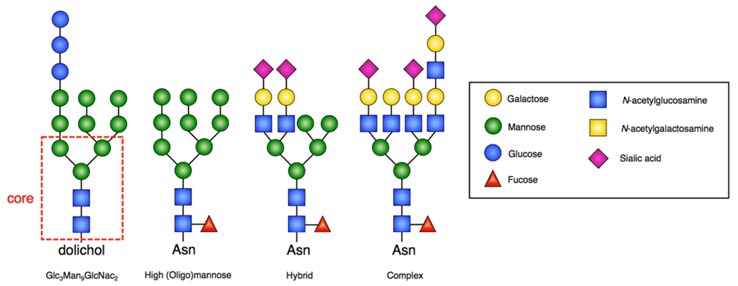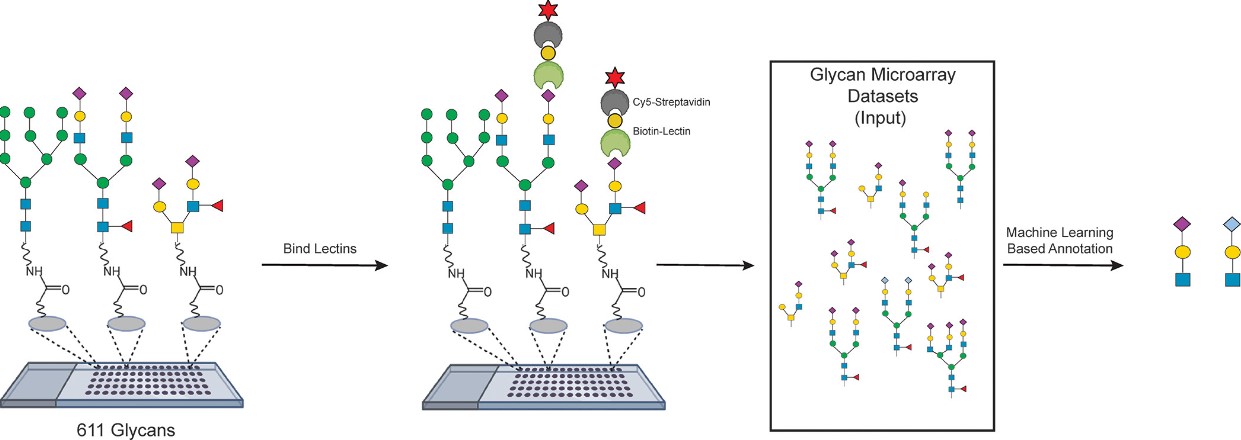100 N-Glycan Microarray
N-glycan is one of the most common modes of glycosylation in the human body. Within the immune system, the N-linked glycans on an immune cell surface will help dictate that migration pattern of the cell. The glycosylation patterns on various immunoglobulins bestow them with unique effector functions. N-glycans may also be involved in cell recognition, which may be relevant to the pathophysiology of various autoimmune diseases. Due to this important effect in signal transduction, the interactions between proteins and N-glycans attract more attention in glycoprotein field. As a world-leading service provider in the field of microarrays, Creative Biolabs offers comprehensive N-glycan microarray service to global clients. We guarantee to provide excellent service and competitive products to customers all over the world.
Introduction of 100 N-Glycan Microarray
N-linked glycosylation is the attachment of an oligosaccharide consisting of several sugar molecules to a nitrogen atom, usually pertaining to an asparagine residue of a protein. This type of linkage is important for both the structure and function of many eukaryotic proteins, while it is very rare in bacteria. The nature of N-linked glycans attached to a glycoprotein is determined by the protein and the cell in which it is expressed and often show different bioactivities. Our 100 N-glycan microarray slides are specially coated to be capable of immobilizing natural N-glycans with close-ring structure at their reducing end (GlcNAc), which acts as the core polysaccharide. 100 N-glycan microarray is used as a general test to help researchers determine binding characteristics of proteins or other potential biological samples to an array of 100 fundamental N-glycans.
 Fig.1 Typical structures of N-glycan and 14-sugar precursor.1, 3
Fig.1 Typical structures of N-glycan and 14-sugar precursor.1, 3
Applications of 100 N-Glycan Microarray
Changes in N-linked glycosylation have been associated with different diseases including rheumatoid arthritis, type 1 diabetes, Crohn's disease, and cancers, while many therapeutic proteins in the market are N-glycosylated antibodies. Moreover, N-linked oligosaccharides, in particular, play a major role in intercellular interactions and immune cell functions, making them often preferred glycan candidates for the study of carbohydrate-binding-vaccines. The fundamental N-glycan structures provided in this microarray can provide an understanding of basal binding determinants for antibodies or other proteins of interest. Furtherly, Creative Biolabs offers more services based on this technology, such as glyco-based vaccine development, Anti-Glycoprotein Antibody Development and so on.
The research of N-glycan is popular in therapeutic antibody development due to its irreplaceable role in the immune system. We have successfully developed many glycan microassay products and corresponding testing services to accelerate your program. For more details, please feel free to contact us.
Published data
Glycans play a vital role in various life activities, but the analysis and research of glycans are still relatively insufficient due to the lack of convenient tools. In recent years, glycan microarray technology has been widely applied to identify glycan binding specificity in more depth, which detects the binding of probes to hundreds of glycans simultaneously. In this study, the authors selected a dataset generated by a functional glycan microarray, which contains 611 sugars, including representative N- and O-glycan structures. The authors incubated the microarray with different concentrations of biotinylated lectins (a total of 116 species), followed by incubation with Cy5-streptavidin. After processing and scanning the slides, the relevant data were extracted. Subsequently, the authors combined machine learning algorithms and manual annotation methods to analyze the glycan microarray data, providing detailed annotations for 57 unique lectins to evaluate their glycan binding specificity. This study provided valuable guidance for the glycan binding specificity of these commercial probes.
 Fig.2 Glycan microarray-based glycan binding specificity analysis.2, 3
Fig.2 Glycan microarray-based glycan binding specificity analysis.2, 3
FAQ
Q1: What types of glycans are included in your 100 N-glycan microarrays?
A1: Our 100 N-glycan microarray contains a variety of basic N-glycan structures, including high mannose, complex, and hybrid N-glycans, which are classified and arranged according to different core skeletons. Each N-glycan is carefully selected to cover the most common and important glycan structures in research.
Q2: How do you fix and detect samples on your microarray?
A2: Our microarray uses a special coating to fix natural N-glycans, which are fixed to the microarray through the closed ring structure (GlcNAc) at their reducing end. When performing sample detection, the sample (such as an antibody or other protein) is added to the microarray, incubated, and washed. Finally, the binding of the sample and the glycan is observed by detection methods such as fluorescent labeling. We provide detailed operation manuals and technical support to ensure that you conduct experiments smoothly.
Q3: Is your microarray suitable for high-throughput screening?
A3: Yes, our 100 N-glycan microarray is designed with high-throughput screening in mind. Through high-density glycan arrays and sensitive detection methods, researchers can analyze multiple samples simultaneously and quickly obtain a large amount of data. This provides researchers with an efficient tool for exploring a wide range of glycoprotein interactions.
Customer Review
Data Analysis Helps Basic Research
“Through the 100 N-glycan microarray analysis service provided by Creative Biolabs, our research team obtained very accurate data. The high sensitivity and specificity of the microarray enabled us to reveal the binding characteristics of multiple proteins with N-glycans. This provided a solid foundation for our in-depth study of the role of N-glycans in the immune system.”
Easy Operation And Excellent Technical Support
“This microarray technology was very easy to operate, and Creative Biolabs provided detailed operation manuals and technical support. They solved any problems encountered during the experiment promptly, thus ensuring the smooth progress of the entire experiment.”
References
-
Lyons, Jonathan J., Joshua D. Milner, and Sergio D. Rosenzweig. "Glycans instructing immunity: the emerging role of altered glycosylation in clinical immunology." Frontiers in Pediatrics 3 (2015): 54.
-
Bojar, Daniel, et al. "A useful guide to lectin binding: machine-learning directed annotation of 57 unique lectin specificities." ACS Chemical Biology 17.11 (2022): 2993-3012.
-
Distributed under Open Access license CC BY 4.0, without modification.
For Research Use Only.
Related Services

 Fig.1 Typical structures of N-glycan and 14-sugar precursor.1, 3
Fig.1 Typical structures of N-glycan and 14-sugar precursor.1, 3
 Fig.2 Glycan microarray-based glycan binding specificity analysis.2, 3
Fig.2 Glycan microarray-based glycan binding specificity analysis.2, 3

